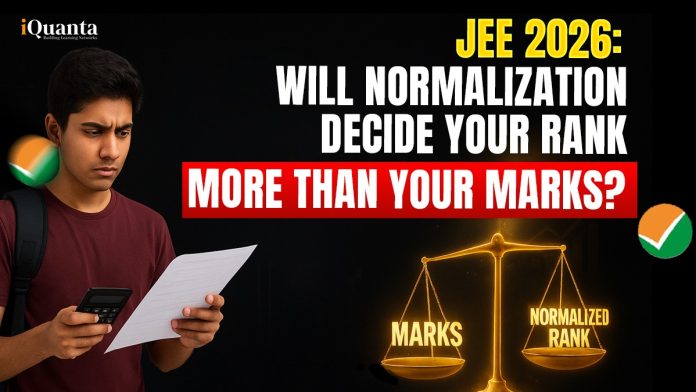As of late August 2025, the National Testing Agency (NTA), has acknowledged rising concerns over the fairness and transparency of its normalization process. The need for this reflected after many students complained about their percentile scores that didn’t align with their raw marks last year. A committee has been formed to make recommendations, and any changes will be decided in the coming months. NTA will publish detailed schedule by Sept – Oct 2025.
Join this free JEE Prep Group to Get Free Study Material, Preparation Strategy by Toppers, Latest Updates and More!

JEE Main Normalization: Current Process
The NTA uses percentile based normalization process to ensure fairness across different sessions and shifts of the exam. The steps are as follows –
- Calculation of Raw scores : Based on the Marking scheme ( +4 for correct, -1 for incorrect MCQ & +4 for correct, -1 for incorrect Numerical)
- Session-wise percentile scores : At first, lets see , how the percentile score is calculated –
Percentile score = No. of candidates who scored equal to or less than you in that shift / Total no of candidates in that shift * 100
For each session, percentile scores are calculated for every candidate based on their raw marks relative to all other candidates in that session. If JEE Mains happens in 10 shifts, the candidates in shift 1 are compared only with the other candidates in shift 1. Similarly for shift2, shift3 etc. This ensures that the percentile is based on the relative performance within that shift. The highest scorer in each session is awarded as a 100 percentiler. After calculating shift-wise percentile, NTA creates a merged list for all candidates across all sessions.Your final percentile determines your All India Rank (AIR). - Percentile calculated to 7 decimal places : Going up to 7 decimal places ensures that even extremely close performances are differentiated.With 7 decimal we can rank them properly.
- Best of two Attempts : If a candidate appears in both the session the better of two percentile scores is used for rank compilation. This is not an average of the two attempts, it is the best of the two.
NOTE: Tie-breaking still applies if two candidates have the same final percentile after best-of-two selection. If you have appeared in only one session then the session percentile is used.
Major Changes Expected in JEE 2026 :
While no final decision has been announced the NTA and Ministry of Education are trying to find ways to get over the past normalization controversies. The on-going discussion might reflect some changes in JEE 2026 exams. Those changes may include:
- Similar to NEET UG , JEE Exam should be conducted in a single shift, to eliminate the difficulty in a normalization process. This removes normalization issues as there will be only one paper and one shift, successfully removing the variation in question paper difficulty. Percentile calculation will be directly based on Raw marks.
- Modification of normalization formulae. NTA might use psychometric analysis to calculate the difficulty index for each shift, and can adjust the raw marks according to difficulty before converting to percentile.
- NTA might adopt Hybrid mode, means, conducting the exam, both online ( computer-based-test) and offline (pen-and-paper), for the same subject or exam.Candidates might be given the option to choose the mode or NTA will decide based on the location, if it is available for the same.
What This Means For JEE Aspirants:
- No Changes yet : As of now, JEE 2026 scoring and normalization will follow the same process as before, unless NTA officially announces it.
- Official update pending: NTA hasn’t confirmed any structural changes yet, so avoid rumors on social media and rely only on official website of NTA.
- Focus on accuracy: For 2025, a new tie-breaking rule was introduced ,and its likely to continue for 2026. If two candidates have same percentile, then the candidates having fewer wrong answers will get a better rank. Instead of blind guessing , attempt only when you are reasonably confident.
Click Here to Enroll to JEE 2026 Course!





